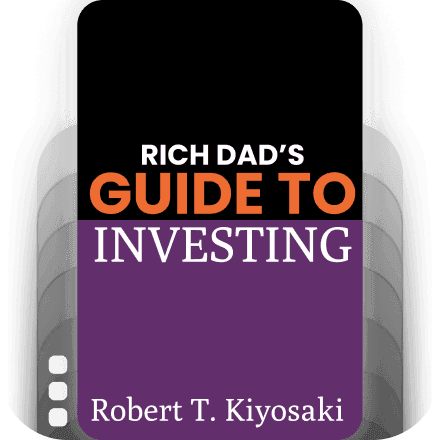
Rich Dad's Guide to Investing
Robert T. Kiyosaki
4.9 - 5 ratings
10
List Points
10
Chapters
5
Topics
Description
Rich Dad's Guide to Investing by Robert T. Kiyosaki aims to shift the reader’s mindset from traditional views on personal finance to adopting an entrepreneurial approach to wealth creation. The book delves into investment principles that transcend conventional strategies, emphasizing the importance of financial education, strategic thinking, and the ability to identify lucrative opportunities. Kiyosaki emphasizes that true financial independence is achievable not through a high-paying job but by understanding how money works, investing wisely, and creating multiple streams of income. The book stresses the importance of thinking like a rich person and building a robust financial foundation for long-term prosperity.
What will you learn?
By reading this book, you will gain a comprehensive understanding of the fundamental principles of investing shared by the wealthy, empowering you to make informed financial decisions. It explores the mindset and strategies that differentiate successful investors from those who struggle financially, emphasizing the importance of financial education, smart asset management, and recognizing opportunities. You'll learn about different types of investments, the importance of leveraging and financial planning, and how to develop a strategic approach to increase your wealth and achieve financial independence.
Who’s it for?
• Aspiring investors seeking financial independence.
• Entrepreneurs looking to maximize their investment strategies.
• Individuals curious about the mindset and principles of the wealthy.
• People interested in personal finance and wealth-building techniques.
• Those wanting to shift from traditional employment to investing-based income.
Categories
Key Learning
Available chapters to listen for this topic- 1
Understanding the Difference Between Good Debt and Bad Debt
Discover how leveraging good debt can help you achieve financial freedom, while avoiding the pitfalls of bad debt that can sabotage your financial success. - 2
The Power of Financial Education
Learn why financial education is key to understanding and mastering money, and how continuous learning can pave the way to accumulating wealth and securing your financial future. - 3
Investing Like an Entrepreneur
Explore how adopting an entrepreneurial mindset in your investing strategy can yield high returns, and understand the critical traits and habits successful entrepreneurs tend to possess. - 4
The Importance of Building Strong Financial Habits
Develop robust financial practices and understand how small daily habits can compound into significant financial growth over time, setting you on the path to long-term wealth. - 5
The Role of Tax Strategies in Wealth Accumulation
Uncover the various tax strategies the wealthy use to legally minimize their tax burden and retain more of their earnings for investment and growth. - 6
Understanding Different Asset Classes
Gain comprehensive knowledge about different types of asset classes, including stocks, bonds, real estate, and alternative investments, to diversify and strengthen your investment portfolio. - 7
The Significance of Financial Goals and Planning
Learn the crucial steps to setting clear financial goals and creating a detailed plan to achieve them, ensuring that every investment decision aligns with your long-term aspirations. - 8
The Mechanics of Cash Flow and Passive Income
Master the principles of generating steady cash flow and building streams of passive income that can replace or supplement your active income. - 9
Leveraging the Power of Teamwork and Professional Advisors
Recognize the importance of building a team of expert advisors, accountants, lawyers, and financial planners who can provide guidance and help optimize your investment strategies. - 10
The Mindset and Psychology of Wealth
Understand the psychological aspects that differentiate the wealthy from the rest, and how cultivating the right mindset can drastically influence your financial success and resilience.
























